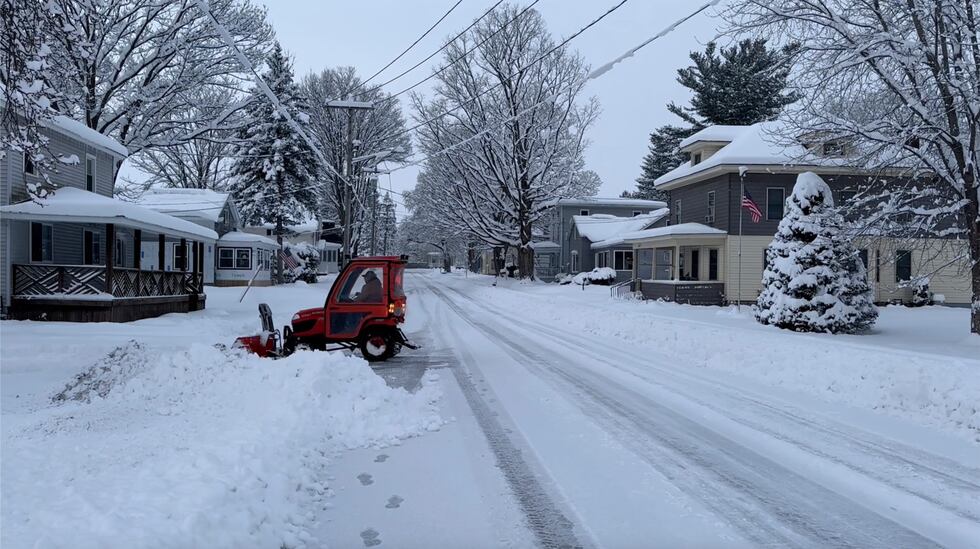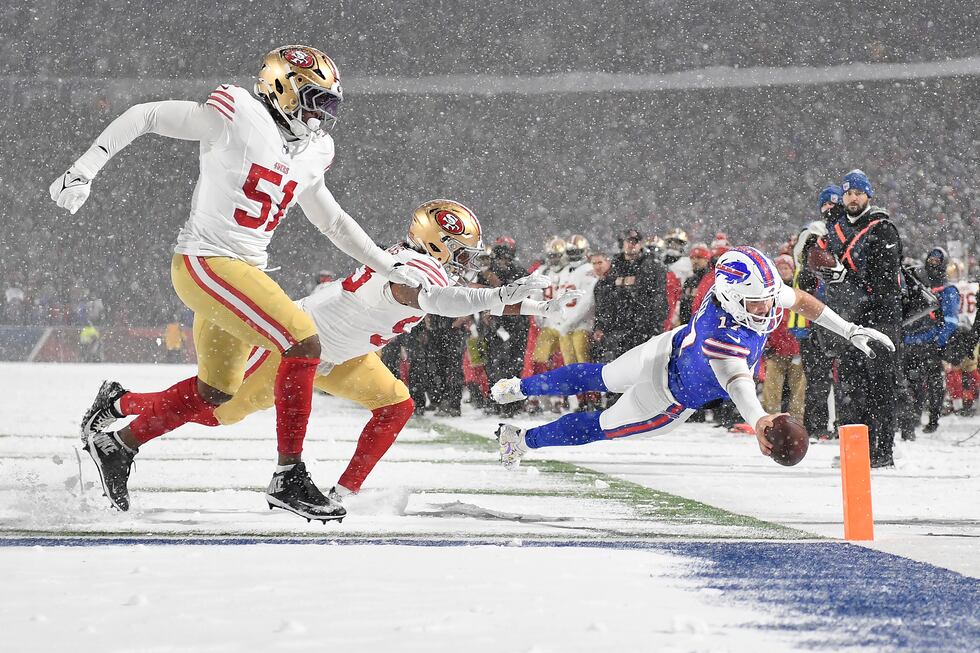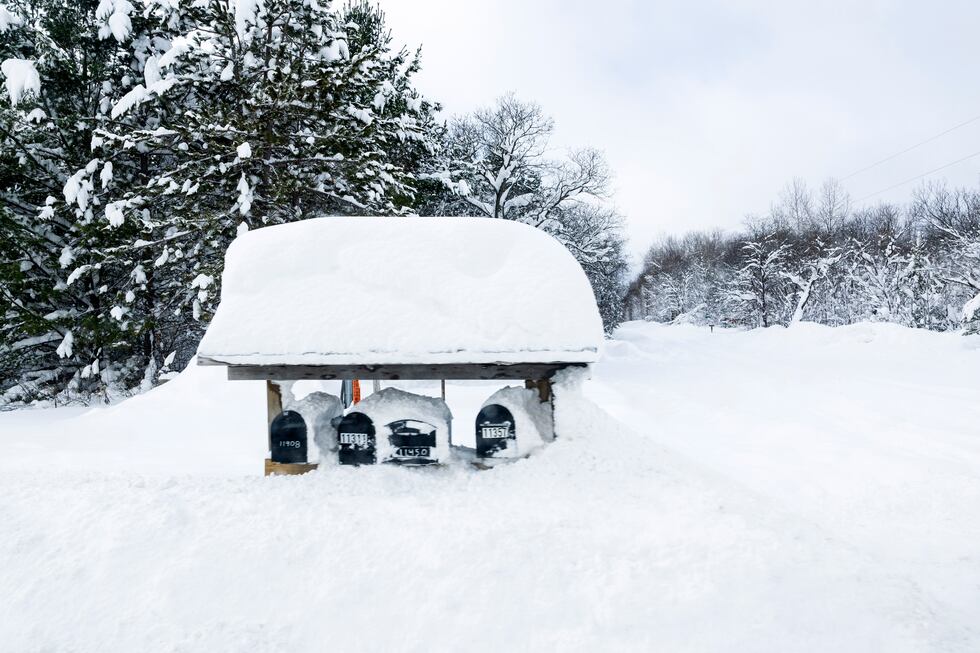(AP) – Some storm-weary residents of the Great Lakes region saw additional snow Monday and faced the prospect of even more accumulations this week after U.S. travelers battled harsh weather to get home after Thanksgiving, forecasters said.
Lake-effect snow continued to fall on parts of western New York that were already blanketed with a foot or more over the past four days. By Monday morning, the village of Cassadaga, east of Lake Erie, recorded 5.5 feet (1.7 meters) of snow. And snow was expected to continue through Tuesday in the largely rural area south of Buffalo.
“We’re expecting about another foot, but some locations will likely pick up a little bit more than that,” said meteorologist Phillip Pandolfo.
Lake-effect snow warnings were in effect through Tuesday night in parts of Ohio, New York and Pennsylvania.
Nearly 4 feet (1.2 meters) of lake-effect snow — caused by warm, moist air blowing across the Great Lakes — fell over the weekend on upstate New York and parts of Pennsylvania and Michigan.
Snow showers fell in western Michigan overnight, and heavier, persistent snow of up to a foot (30 centimeters) was expected to follow Monday, the National Weather Service said. More snow is expected Wednesday and Thursday, along with gusty winds and freezing temperatures.

Skies were clear east of Lake Ontario in northern New York, where some residents were still digging out from mountains of snow.
“We’ve got snow banks that are higher than me — that’s pushing probably 8 to 10 feet high,” said Mary Shambo, owner of the Cottage Inn in Copenhagen, New York. The small village received just under six feet (1.8 meters) of snow in four days.
Shambo and her husband, Ben, managed to stay open through the thick of the storm this weekend. Some locals arrived by snowmobile, but they mostly served truckers who pulled off the road when bands of snow became particularly fierce.
“It goes from whiteout conditions to clear,” she said, “so they would take off when it was clear and hope to God they got to where they needed to go.”
In Ohio, the mayor of Geneva-on-the-Lake has been using a backhoe almost nonstop since Thursday to clear more than four feet of snow that socked the quaint village siting along Lake Erie east of Cleveland.
“It was just relentless. We’d plow and a couple hours later it’d be back again,” said Mayor Dwayne Bennett. “Every business down here has been shut down the last four days. You can’t even get in the front doors.”
“The problem is we’re not equipped to handle this much snow in this amount of time,” he said.

Flinty fans scoffed at the flurries and numbing temperatures during Sunday’s nighttime NFL game in Buffalo, New York, against the San Francisco 49ers.
The NFL’s Bills said the organization would pay $20 per hour and provide food and hot drinks to snow shovelers.
The lake-effect storm began hitting the area Saturday near the Bills’ stadium in Orchard Park, New York. Though the storm shifted south of the stadium by noon Sunday, snow continued to fall off and on through the day. Flurries began to fall more heavily just before kickoff. The game was played in chilly conditions, with the temperature at 27 degrees (minus 3 Celsius), with the wind chill making it feel like 17 (minus 8 Celsius). The Bills often play in such conditions at home late in the season.
Tim LoTemple, a Bills season-ticket holder from Rochester, New York, and part of the team’s rabid fan base known as “Bills Mafia,” said the freezing temperatures and snow energize the players and fans. Still, the 49ers game was practically temperate compared to previous matchups at Highmark Stadium.
“We love snow over here. You know how Bills Mafia is, we love the cold,” he said from a parking lot tailgate party. “This is nothing compared to what we’ve seen before.”
But for Jake Dyer, an Indianapolis Colts fan visiting from Southern California, a cold-weather game is a rarity.
“Only thing I didn’t prepare for was shoes. I double up on everything else, but my feet are cold,” he said. “Mad respect for anybody who comes out. Anybody can sit at home, comfy in their chair to watch this game.”
Up to 17 inches (43 centimeters) of snow fell in Alaska’s capital city of Juneau over the weekend as part of a system that was “definitely stronger” than what the region typically experiences this time of year, said National Weather Service meteorologist Greg Spann.
Snow had transitioned to freezing rain early Monday, he said, with roads icy in some areas. Wet, heavy snow was piled on sidewalks along busy streets near downtown Juneau, and slushy pools were forming at some intersections. School went to remote learning in Juneau on Monday, and state offices were closed due to freezing rain. Ice encased the thin branches on some trees.
The forecast called for rain and unusually warm temperatures, in the 40s, this week.
While some other communities north of Juneau also got heavy snowfall, further south there was heavy rain. Ketchikan received 6.38 inches (about 16 centimeters) of rain over 24 hours, Spann said.

Parts of Michigan were battered by lake-effect snow as bands rolling off Lake Superior buried parts of the Upper Peninsula under 2 feet (61 centimeters) or more, said Lily Chapman, a weather service meteorologist.
Twenty-seven inches (69 centimeters) of snow fell northeast of Ironwood, in the Upper Peninsula’s western reaches. More than a foot (30.5 centimeters) could fall over the eastern Upper Peninsula through Monday morning, Chapman said Saturday.
___
Contributing to this report were Susan Haigh in Norwich, Connecticut; John Seewer in Toledo, Ohio; and Becky Bohrer in Juneau, Alaska
Copyright 2024 The Associated Press. All rights reserved.